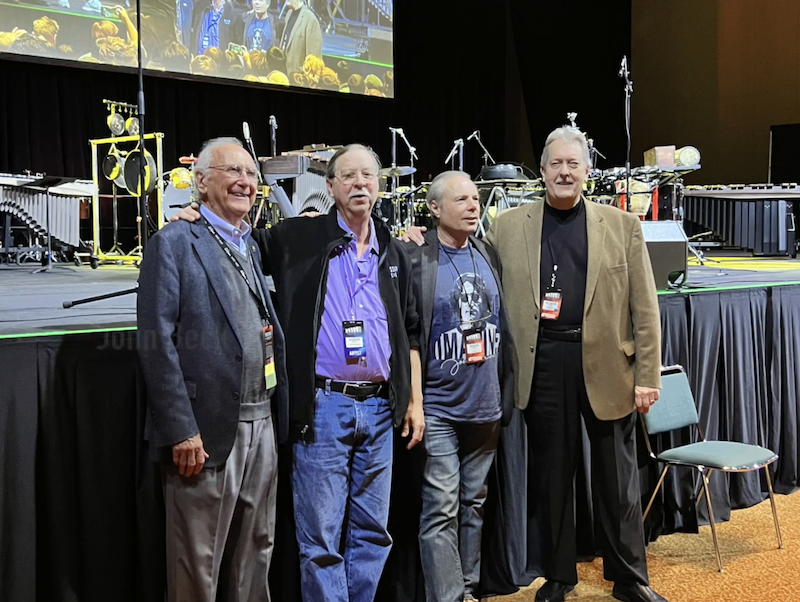Questions, reality, and musings on a life of joy and wonder
Vol. 2, No. 12
December 12, 2022
Professional Development
By Rich Holly
Professional Development is a phrase used often in educational and corporate settings. I don’t know if it’s thought of in those terms among freelance artists. But whatever you may call it, I hope you’re involved in constantly learning, constantly adding to your skill sets, constantly networking, constantly assessing, and constantly being amazed by others in your particular art form.
If you’ve read previous posts of mine, you know I frequently discuss how important it is to keep growing and learning. Yet I wonder how many of you are pursuing your learning through organized state, regional, national, or international organizations. Anecdotally I’ve heard that the current and recent former generations of college students in the arts are not inclined to join an organization – there are so many great (and, let’s face it, horrible) resources available for free on the internet, and these younger folks are questioning why they should pay money to belong to an organization to access similar information. And questioning is good – another trait I encourage frequently. If you’re in that age group, I hope you’ll strongly consider joining your professional organization.
I can tell you from my own experience how important is has been to me to be a member of my professional organization, the Percussive Arts Society. I joined in 1974, worked on committees and as a chapter officer at the state level, then committees and an editor position at the national level, then a board of directors’ member, served as an officer for eight years and then president of the organization for two years, and as a past president am a now a member of the Advisory Board for life.

Rich with three great friends being honored for attending 40 or more annual Percussive Arts Society International Conventions. L to R: John H. Beck, Professor Emeritus, Eastman School of Music; Gordon Stout, Professor Emeritus, Ithaca College School of Music; Rich; David Eyler, Professor, Concordia College.
Here’s a little history of not just my professional organization, but just about all of them. Before the internet, and certainly before YouTube and other video platforms became available, the Percussive Arts Society was the only place to learn about the latest trends, techniques, and music other than your private teacher or any traveling clinicians. It was instrumental in the careers of thousands of percussionists world-wide, and is, still to this day. With online videos becoming prevalent in the mid-2000s came competition for where to go in order to learn something new, often with buckets of corporate dollars behind the production of those videos, and maintaining a large membership in the organization became a challenge.
Similar membership woes were faced by virtually every arts organization that provided educational materials for their members, which forced all such arts organizations to re-think their approaches and benefits to their members. Some organizations struggled more than others. But most, if not all, continue to provide benefits that other learning methods cannot.
I recently read an extremely well-worded post on social media about the difference between tribes and teams. In essence, a team is a group of people brought together by someone else to get a specific job done. A tribe is people who think and act and believe in most or all of the same things you do. I don’t know about you, but a tribe is what I want to be part of.
Your professional organization is your tribe. They will learn from you and support you, and you will learn from them and support them. Teams might develop due to the tribe’s needs, but at least those teams are made up of tribe members.
Here’s a great song and creative video from OK Go about staying focused no matter what, showing a tribe acting as a team:
For me, my tribe has been the Percussive Arts Society. The networking and relationships I’ve been able to build over these many years have been invaluable to me. I’ve learned so much, been astonished by a wide variety of artists from around the globe, received great help, support and advice when I’ve needed it, and provided resources and understanding to other members when they’ve needed it. The monthly journals, weekly newsletters, and social media posts are always informative in some manner and keep me connected to things and people I love. The annual convention, typically attracting 6000-7000 percussionists of all ages from all over the world, is an incredible display of how our tribe appreciates each other and wants to learn more from each other.
I’ve been a member of other arts and leadership organizations as well. Some I would consider to be among my tribes, some, well, not so much. In all, I definitely learned things and developed additional professional relationships which have served me well. So, in addition to joining the organization that is your tribe, you might consider joining an organization or two that are a little on the outskirts of your tribe. And it’s okay to join for a year or two to try it out. If it’s not working for you, move on to another organization.
Mostly I would love for each of you to gain the same benefits I’ve had through your professional organization and the development opportunities they provide. If you’re not sure which professional organization to join, feel free to reach out to me and I’ll be more than happy to help you make that decision. We all deserve the support and education these organizations provide, and the other members deserve the support and education you can provide to them.
Rich Holly serves Arts NC State and the NC State University community as the Executive Director for the Arts.
All posts in the “Our Life in the Arts” series are available here.